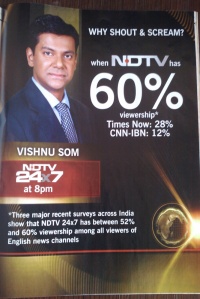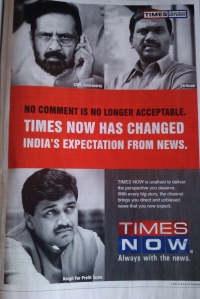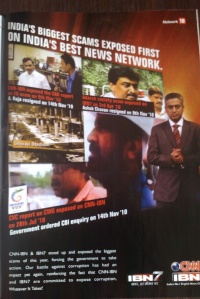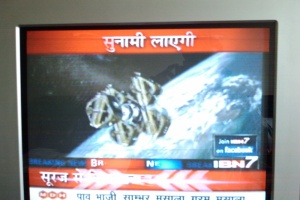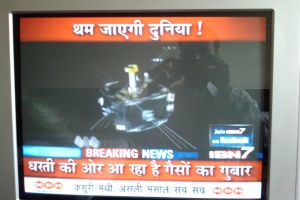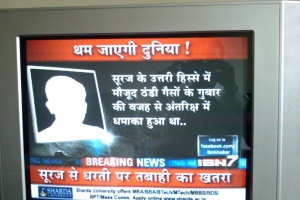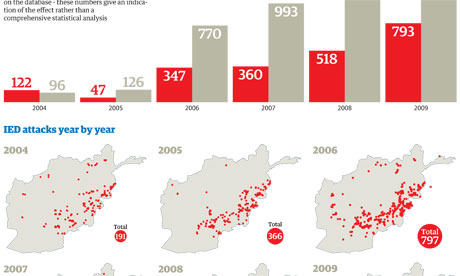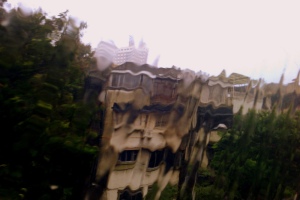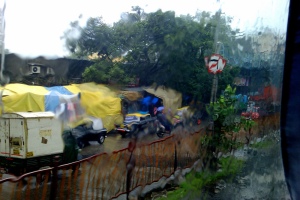Musings from India about Movies, Music, Startups, Technology, Travel and Photography...
Thursday, December 16, 2010
Monday, November 29, 2010
What Will You Remember About the Year 2010 in India?
Here is what I will remember the first year of second decade of second millennium -
Apart from the scandals mentioned in the advertisements here, look how each news channel claims of exclusivity and popularity. With the 'paid news' controversy and the involvement of media personalities in 2G scam (aka RadiaGate), the media ethics have become the main point of a vigorous debate in 2010.Keep your fingers crossed for a positive outcome of all these corruption scandals which marked the year of 2010.
* All these pages have appeared in these 2 magazines - Outlook, Open.
Monday, November 15, 2010
Media In Dilemma
Here is the link to my post on Indian media facing a dilemma. It is published on blog of MediaNext - my company.
Wednesday, October 13, 2010
The Unsung German of India [CWG, Sports]
In spite of all the controversies that preceded the Delhi Commonwealth Games, I must say that I enjoyed every moment during the last 11 days. Sometimes I even wondered where are the falling roofs? Where are the clogged toilets? What was on screen was pure sports, pure joy. Isn't it these sports moments which shape the pride of a nation - the stock index of happiness and pride moving up or down with every medal that is won or lost?
And, all these controversies went completely into oblivion when India put a stellar performance at the Games. In India, we are raised to believe that there are only 2 games at which India can win - Cricket, and then Cricket (- add corruption and babies-making to it, might say some mockingly). So, one never expects an Indian to win in other games, more so in athletics. No way! No way, unless he or she is raised, bred or trained from childhood in US!
But in 2010, India did win some medals (a spectacular 1-2-3 in women's discuss throw, and a gold medal in 4X400 relay - women's, and some more).
In this context, I came across the story of the day - a story of a hero whose connection with India only a few might be knowing. His name was Otto Peltzer - a German athlete who made tremendous impact on India athletics.

Here is his story from Australian newspaper the Age -
J.S.Saini, the 83-year-old track and field guru who for two decades was India's chief national coach, called him the father figure of Indian athletics. Norris Pritam, who ran under Peltzer as a teenager, said no one had made as big an impact on Indian athletics as the man they knew simply as ''Doc'', and no one ever would.
His story is a moving story, in the sense that he is a forgotten hero in India. Let's hope that his efforts will find recognition as India continues on the path of more sporting glory.
Here is the link to the story.
Here is the Wikipedia entry for Otto Peltzer.
Friday, October 8, 2010
Wednesday, September 22, 2010
Nice Article By Shubha Mudgal
Social/cultural sentiments is a funny and controversial phenomenon. You never know whose sentiments are you hurting with even a casual comment or remark. And in India, the controversies arising out of sentiment-hurting are as widespread as are the types of religions, castes, practices, languages, dialects, mores. When the sentiments of people and groups are ever alert for catching anything pointed at them, it is rare to hear sane voices amongst the din. But I was surprised (and glad) to see this piece in Mint newspaper, by Shubha Mudgal - noted vocalist and a good writer too. Read this opening - Those Western Values For a nation with the wealth of art forms and musical genres that India has, it has never shown too much concern for the preservation of its artistic heritage. Or for creating channels of dissemination for the traditional art and music that has survived against the greatest odds. She writes further - Not for a moment am I considering joining hands with the brigades of buffoons and goons who—in the name of upholding Indian culture—bash people up in parks for holding hands or indulging in a bit of necking. I am merely suggesting that it might be a good idea to emulate paschimi sabhyatanow and again, especially when it comes to the organized manner in which the West preserves musical and artistic heritage. Here, she is referring to the work Smithsonian Institute is doing for preserving vocal traditions not only from USA but from all over the world. She was surprised to find a 1938 collection of Marathi songs - collected by a dutch fellow Beck, on the site. Now this is what preservation of culture is.
Monday, September 13, 2010
A Day (Off) Before US Open Final
You have to have read Andre Agassi's autobiography 'Open' to imagine what it means for the tennis players to get a day off before finals of a grand slam (or any tournament). This book gives you so many insights into a tennis pro's life that you start loving the game in a totally different manner.
This year, at US Open, it was Djokovic's turn to get overjoyed because of the day off before his slated final against Spanish bull - Rafael Nadal. Djocovic played the second semifinal against top favorite Federer and won it in a gruelling five setter. In the US Open, winner of second semifinal does not get a day off like the first finalist does. He has to recuperate through a single night before going for the gruelling fight of the final.
(Image - Wikipedia)The awe-inspiring beauty called Arthur Ashe stadium does not have a cover for rain. It means that Djocovic got exactly what he needed most - rest. Read in NYTimes article that the Arthur Ashe stadium, the biggest tennis stadium in the world with a capacity of 23771 seats, will need a whoopping $ 150 million to get a retractable roof, and also some re-engineering due to its size and structure!
Now it will be fun watching the two players play for their life and a grand slam. Though Nadal is a favoured one, my heart wants to see Djocovic (the eternal No. 3 after Federer and Nadal) to win. He has the potential to win the game...
Wednesday, August 25, 2010
Do You Agree?
Media and its trivializing effect on even profound matters is an interesting (and sad) thing to watch and observe. In India, the media has a long history of being the major player in political/public discourse - and this has its own merits and pitfalls.
Currently, the media scene in India is spearheaded by the TV news channels. With their foolish, superficial knack of picking up issues which are equally foolish, and elitist, these channels are a classic example of how a responsible media should not be.Here is an example (Hindi language) of a TV report appeared on CNN-IBN, a leading Hindi news channel in India.---All this came to mind today, when I watched 'Frost/Nixon'.
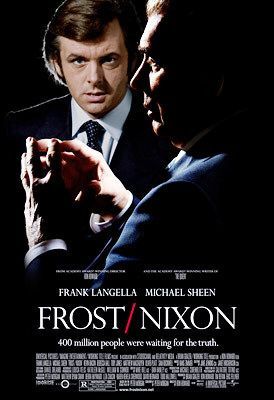
James Reston, Jr.: You know the first and greatest sin of the deception of television is that it simplifies; it diminishes great, complex ideas, stretches of time. Whole careers become reduced to a single snapshot.At first I couldn't understand why Bob Zelnick was quite as euphoric as he was after the interviews, or why John Birt felt moved to strip naked and rush into the ocean to celebrate. But that was before I really understood the reductive power of the close-up, because David had succeeded on that final day, in getting for a fleeting moment, what no investigative journalist, no state prosecutor, no judiciary committee or political enemy had managed to get - Richard Nixon's face swollen and ravaged by loneliness, self-loathing and defeat.The rest of the project and its failings would not only be forgotten, they would totally cease to exist.
Don't you agree?
Tuesday, July 27, 2010
Wikileaks, India?
The furore caused over the Afgan war logs leak over Wikileak is extremely satisfying for me. Such leaks atually fill the gap which the Right to Information acts can not fulfill in various countries. And less secrecy is always welcome. Weber has said about bureaucracy that it thrives on the control over information.
Read this story in Guardian about how the teams of datajournalists worked on the leaks -
It was central to what we would do quite early on that we would not publish the full database. Wikileaks was already going to do that and we wanted to make sure that we didn't reveal the names of informants or unnecessarily endanger Nato troops. At the same time, we needed to make the data easier to use for our team of investigative reporters: David Leigh, Declan Walsh, Simon Tisdall, Richard Norton-Taylor. We also wanted to make it simpler to access key information for you, out there in the real world ??? as clear and open as we could make it.The data came to us as a huge excel file ??? over 92,201 rows of data, some with nothing in at all or were the result of poor formatting. Anything over 60,000 rows or so brings excel down in dramatic fashion ??? saving takes a painfully long period of time (tip number one ??? turn automatic saving off in preferences???). It doesn't help reporters trying to trawl through the data for stories and it's too big to run meaningful reports on.
After reading the story, I wondered will Indian media ever can pull off such a coup? Will the owners of media houses in India allow their reporters to work on something so secret and so important?
Indian media, unfortunately is now a part of the unholy nexus of politicians, bureaucrats, & corporates - all who have access to important information within their domains. However, I must say that - to some extent - TV channels in India seem to be more independent.
Sunday, July 18, 2010
Awakening Thoughts

You wish so many things to happen. You want so many things so desperately.
For instance, I want to pursue 3 things very very desperately. First is to train for a marathon. Second, I want to pursue photography. Third, I want to undertake boxing. Fourth, I want to go for higher studies. Fifth, I want to go on a long vacation to Ladakh. And so on.
Somehow, I feel that doing these things might satisfy me from within. Doing them will fulfill me, complete me.But there are so many things which prevent me from doing these things. Some are practical issues, some are my own mental restrictions. A few months ago I started playing table tennis again. I had played the sport at school with some moderate success. But then was completely out of touch for so many years. But I am playing it again. I am thinking of improving my game to my old levels. I don't know how much this is fulfilling me, completing me.But, hey! You know, I am actually doing this.So what's the point?How about thinking about the things which I am already doing, concentrating on it, improving myself at it? I am actually pursuing the sport because it is very within reach for me. There is a table tennis table in community hall where I live, plus I have got so many playing partners there. That is the reason why I started playing it without giving much thought. Now, as you change your focus - to the things which are withing your easy reach, and to the things which you are already doing, I feel liberated. You will feel that even these activities are equally fulfilling. It is not important what you are doing.
It is important whether you are doing something or not.
There will be ample time to go for more difficult desires.Now is the time to do it, and do it more passionately. It is all about journey. Not about reaching there.
*Image - Flickr
Saturday, July 17, 2010
My (new) Musings (And some old - imported from previous blog)
First things first. I admit that this is not the first time that I am migrating. I started first with...ok, I do not remember with which blogging platform. But my first serious attempt at blogging was with wordpress...let me check if that blog is still alive - must be so, 'cause I did not kill it.
It was on wordpress.COM, so it offered so less flexibility that I decided to switch to Blogger - which after being acquired by Google, was rolling feature after feature, and was quite hot. So, on one fine day, I killed my blog-growth at wordpress and shifted to Blogger.
I must say that I never flourished on Blogger. Somehow, I found Blogger offering flexibility in a very rigid way. Yet I blogged consistently there. My made-famous-by-Freakonomics post 'What A Business Model' about Mumbai's local train??travelers??was written on that blog. As also my featured-in-Mint post - 'Villages Or Cities?', and an update on it - which was a response to an article in Mint by economist Atanu Dey (%$#@*^&! I did not have the link to my post on LiveMint.com).
Anyway.
Now here I am. After trying many things on many platforms...this is my new attempt at writing regularly.
Let's see...
Friday, July 16, 2010
Wednesday, July 14, 2010
Monday, July 5, 2010
Friday, July 2, 2010
Thursday, July 1, 2010
Conquest of Happiness - the Common Sense Way
The capacity to endure a more or less monotonous life is one which should be acquired in childhood. Modern parents are greatly to blame in this respect; they provide their children with far too many passive amusements, such as shows and good things to eat, and they do not realise the importance to a child of having one day like another, except, of course, for somewhat rare occasions.
The pleasures of childhood should in the main be such as the child extracts from his environment by means of some effort and inventiveness. Pleasures which are exciting and at the same time involve no physical exertion, such, for example, as the theatre, should occur very rarely. The excitement is in the nature of a drug, of which more and more will come to be required, and the physical passivity during the excitement is contrary to instinct. A child develops best when, like a young plant, he is left undisturbed in the same soil. Too much travel, too much variety of impressions, are not good for the young, and cause them as they grow up to become incapable of enduring fruitful monotony.
I do not mean that monotony has any merits of its own; I mean only that certain good things are not possible except where there is a certain degree of monotony. Take, say, Wordsworth's Prelude. It wll be obvious to every reader that whatever had any value in Wordsworth's thoughts and feelings would have been impossible to a sophisticated urban youth. A boy or young man who has some serious constructive purpose will endure voluntarily a great deal of boredom if he finds that it is necessary by the way. But constructive purposes do not easily form themselves in a boy's mind if he is living a life of distractions and dissipations, for in that case his thoughts will always be directed towards the next pleasure rather than towards the distant achievement. For all these reasons a generation that cannot endure boredom will be a generation of little men, of men unduly divorced from the slow processes of nature, of men in whom every vital impulse slowly withers, as though they were cut flowers in a vase.
I do not like mystical language, and yet I hardly knows how to express what I mean without employing phrases that sound poetic rather than scientific. Whatever we may wish to think, we are creatures of Earth; our life is part of the life of the Earth, and we draw our nourishment from it just as the plants and animals do. The rhythm of Earth life is slow; autumn and winter are as essential to it as spring and summer, the rest is as essential as motion. To the child, even more than to the man, it is necessary to preserve some contact with the ebb and flow of terrestrial life. The human body has been adapted through the ages to this rhythm, and religion has embodied something of it in the festival of Easter.
I have seen a boy of two years old, who had been kept in London, taken out for the first time to walk in green country. The season was winter, and everything was wet and muddy. To the adult eye there was nothing to cause delight, but in the boy there sprang up a strange ecstasy; he kneeled in the wet ground and put his face in the grass, and gave utterance to half-articulate cries of delight. The joy that he was experiencing was primitive, simple and massive. The organic need that was being satisfied is so profound that those in whom it is starved are seldom completely sane.
Many pleasures, of which we may take gambling as a good example, have in them no element of this contact with Earth. Such pleasures, in the instant when they cease, leave a man feeling dusty and dissatisfied, hungry for he knows not what. Such pleasures bring nothing that can be called joy. Those, on the other hand, that bring us into contact with the life of the Earth have something in them profoundly satisfying; when they cease, the happiness that they brought remains, although their intensity while they existed may have been less than that of more exciting dissipations.
Tuesday, June 22, 2010
Why Piracy Sustains?
There is 1 thing that makes people sensitive to price, and it is the 'Experience'. I am ready to spend Rs. 100 for a CD of good songs (even Rs. 100 for a song like 'coffee...' which is composed by you). But the thing is that the the distribution sucks. Believe me. I will prefer paying Rs. 50-100 for a VCD/DVD which have been made available by Mosaer-Byer instead of downloading the movie via torrent which might take 12 hrs. But to buy a CD, I have to go [:(] and face a sales-person [:(] who sucks [:(]. He just does not understand 'value' of what he is selling. So, the CD's are just thrown into a box [:(], and the customers are expected to make a 'discovery' of what they want [:O]. Compare this with pirated material. Take e.g. torrents. You can search [:)], you can download samples [:)], you can read comments [:)], check ratings [:)] - and if all THAT satisfies you, you download the item. The factor that the item is free ('stolen', if you please) is, thus, essentially secondary.It is all about 'experience of buying' - if the experience is good (as in CCD) I am ready to pay Rs. 100 (for 1 cup of coffee). If it is bad (as in most taparis), I decide against paying even Rs. 5 and prefer to go home and make myself a cuppa.And believe me, for artistes, their time will have more 'value' than your actual creations when you are alive.
Wednesday, January 20, 2010
Linkbundle: NYTimes.com Paywall Decision
Here are some links which more insights and analysis about NYTimes.com decision to implement paywall/metering for its content -
1. NYT execs' memo to staff about metered model for NYTimes.com - Romensko
An Important Decision about Our Future
Today we are announcing that we will be introducing a paid model for NYTimes.com at the beginning of 2011. As you will see in the press release, we have chosen a metered approach that will offer users free access to a set number of articles per month and then charge users once they exceed that number.
2. NYT Describes Online Plans - Vallyweg
A tipster was selected for a survey on nytimes.com and graciously copy/pasted from it for our benefit. The Times was gauging interest in two premium packages that it calls NYT Gold and NYT Silver.
3. Monetize The Audience, Not The Content - A VC
The worst examples of subscription services are those that break the content up into free and paid. It's as if some content is worth more than other content. I think that is the wrong idea most of the time, and especially in news and news related content.
4. Only 2.4% subscribe at newspaper pay sites - Reflections of a Newsosaur
A puny 2.4% of print subscribers is the average number of people paying for online content at the handful of daily newspapers that have been bold enough to erect pay walls, according to a new survey.
